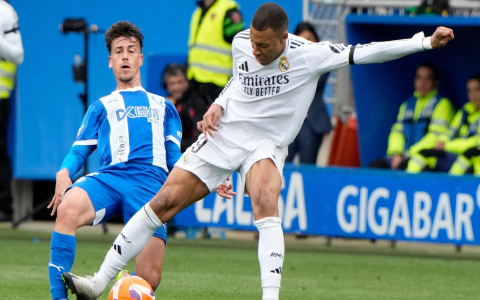I woke up extra early this morning, earlier than usual. Not because of the alarm, but because I knew—Real Madrid was playing Alavés today, a match I couldn’t afford to take lightly.
While brewing coffee, I thought:
“Gotta check the squad status fast—any injuries? Will the starters play?”
It’s like checking the menu before eating; without knowing who’s on the field, watching the game just isn’t the same.
Then my hand shook, spilling a bit of coffee on my pants. Sigh, I was just too anxious.
I fired up my laptop and started hunting for news
I grabbed that old notebook I’d used for years—the edges curled, crumbs from potato chips still stuck to it. But I liked jotting things down in it; it felt more real.

Then I booted up my laptop and went straight to a few Spanish soccer news sites I regularly check. These places usually break player news first—even if it’s sometimes just rumors, it’s better than knowing nothing.
I started scrolling through each article, my eyes fixed on every headline related to Real Madrid.
First piece of bad news: Courtois still out
The first headline that made my heart sink: Courtois is still injured and can’t play.
He’s Real Madrid’s starting goalkeeper—tall, quick reflexes. With him in goal, the defense feels solid. But he’s been plagued by recurring injuries since last year, and this time he hasn’t fully recovered.
I immediately scribbled in my notebook: “Courtois—Out.”
I felt a twinge of sadness, not for the team’s chances of winning, but because he seemed so unlucky, always getting injured at crucial moments.
Who would fill in at goalkeeper?
After scanning the options, it seemed Lunin would start. He’s the backup keeper and quite capable, but not the first choice—the pressure would be immense.
Vinícius’s situation had me on pins and needles
Next, my biggest concern was Vinícius. He’s the heart of Real Madrid’s attack—blazing fast, fearless in dribbling. With him on the field, opposing defenders are on edge.
But several websites reported that morning: “Vinícius felt unwell during training and might be rested.”
My heart sank: No way! You’d rest him for a game like this?
I kept refreshing the page, terrified of missing any updates.
A little while later, new information came out: He only has a minor discomfort, has joined full training, and is highly likely to start.
Only then did I breathe a sigh of relief, rewriting in my notebook: “Vinícius — should be fine, will play.”
Mendy’s situation is the most chaotic, with conflicting reports
Then there’s left-back Mendy. He’s solid defensively and rarely makes mistakes, but he’s been dealing with injuries lately.
The problem is, different websites are saying completely opposite things:
- One says he trained alone yesterday, indicating he’s not fully recovered;
- Another says he participated fully in the team session and is in good shape.
My head was spinning. I scribbled a huge “?” on my notebook:
“Mendy—can he play or not? No one knows for sure.”
This is the worst kind of situation—not getting a clear ‘yes’ or “no,” but being fed conflicting information that leaves you guessing.
Bellingham is rock-solid, no worries
In contrast, Jadon Bellingham is a much more reassuring presence.
His performance this season has been phenomenal—dominant in midfield, contributing both defensively and offensively, and scoring goals.
All reports confirm he’s in top form, training normally with no issues whatsoever.
I wrote it down decisively: “Bellingham—no problem, definitely playing.”
With him on the pitch, Real Madrid’s midfield gains immense confidence.
Don’t Forget Alavés Also Has Injury Concerns
I’ve been so focused on Real Madrid I almost forgot to check on the opposition.
For Alavés, there’s a young forward named Omorodion who’s been playing well lately.
But reports suggest he collided with a teammate during training, hitting his knee and feeling some discomfort.
I checked Alavés’ official website but found nothing—not a single word.
This was odd. Teams usually issue brief statements, yet they remained completely silent.
I could only note: “Omorodion—reported injury, but no official word. Likely out.”
If he can’t play, Alavés’ attack will be significantly weakened.
Finally, reliable updates complete the picture
I waited until around 10 AM before several credible outlets simultaneously reported:
- Courtois confirmed out
- Vinícius likely to start
- Mendy included in squad, available to play
- Bellingham fully fit
- Alavés’ Omorodion highly unlikely to feature
Only then did the weight lift from my shoulders.
I reorganized my scribbles into a clear list:
Real Madrid Player Status:
- Goalkeeper: Lunin starts, Courtois rests
- Winger: Vinícius available
- Left-back: Mendy available
- Midfield: Bellingham fine
Alavés:
- Forward Omorodion may not play, other starters normal
Why is checking a roster so hard?
This time, checking player info took me over an hour—my coffee went cold, and I skipped lunch.
I summarized why it’s such a hassle:
- Official lists aren’t released promptly
Clubs always wait until the last minute to post rosters, leaving fans to guess. - Media reports are inconsistent
Some journalists say he’s available, others say he’s out—you can’t tell who’s more reliable. - Information is scattered
You have to check multiple websites, piecing together fragments like a jigsaw puzzle. - Opponent news is harder to find
Everyone focuses on Real Madrid; no one seriously covers a smaller team like Alavés.
Finally, I shared the update
I posted the compiled info on my personal blog titled: “Real Madrid vs. Alavés: Latest Player Status Update.”
Though brief, I believe it’s valuable.
At least it saves fellow fans time digging for details, letting them relax and enjoy the match.
Now, with kickoff approaching, I can finally sit down, take a sip of hot coffee, and get ready to watch the game.
That’s how football is—
The match lasts only 90 minutes,
But to truly understand it,
You might spend hours figuring out:
Who’s playing, who’s resting, who’s pushing through.
These details are where the real game begins.
